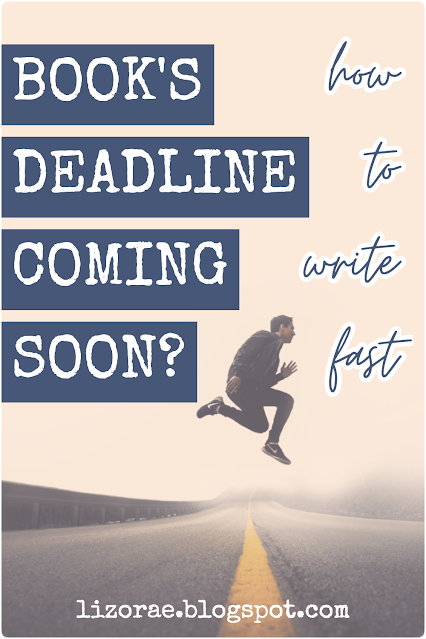On A Deadline? How To Write Fast
As authors, we often feel the need to pump content out as fast as we can. Maybe it's because you're being pressured by publishers. Maybe it's because you're being pressured by fans.
Whatever the reason, the faster you finish things, the more you get done. The more you get done, the more money you make. The more money you make, the less work you have to do on other things which means more writing time. The more writing time, the-
You get the point.
When you're starting out writing, it's handy to have a few books you already have to set you up for that dream novel you've been wanting to write all your life.
But how do you navigate the mess of deadlines to get your buffer book done in time? That, my friend, is a good question.
Whatever the reason, the faster you finish things, the more you get done. The more you get done, the more money you make. The more money you make, the less work you have to do on other things which means more writing time. The more writing time, the-
You get the point.
When you're starting out writing, it's handy to have a few books you already have to set you up for that dream novel you've been wanting to write all your life.
But how do you navigate the mess of deadlines to get your buffer book done in time? That, my friend, is a good question.
Let's get to!
Start as early as you can. Maximise the time you have to the fullest. Believe me, even a minute extra can make a difference.
Say you start early, follow the next six steps and finish early. It's not a problem. Spend that time editing and refining your work. The more edits, the better it is!
There's a lot of debate whether having a plan for your novel is necessary. You know, the ol' plotters versus pantsers argument. Well, I'm going to just go ahead and say, if you want to write fast, have a plan.
You don't want to be halfway in your story and realise it's not going to work. You're going to waste much of your precious time trying to go back and revise. It'll interrupt your workflow. Who has time to spend on getting back into the flow?
Even if you don't write it down, a clear structure in your mind can be a lifesaver. Or, in this case, a time saver.
1. Start early.
When you have a deadline to work to, you want as much time as possible to finish writing your book. Not only will it allow you to be less stressed, but it also increases the amount of time you have to write. I mean, duh!Start as early as you can. Maximise the time you have to the fullest. Believe me, even a minute extra can make a difference.
Say you start early, follow the next six steps and finish early. It's not a problem. Spend that time editing and refining your work. The more edits, the better it is!
2. Get a plan.
 |
| Source: Imgur |
You don't want to be halfway in your story and realise it's not going to work. You're going to waste much of your precious time trying to go back and revise. It'll interrupt your workflow. Who has time to spend on getting back into the flow?
Even if you don't write it down, a clear structure in your mind can be a lifesaver. Or, in this case, a time saver.
3. Type fast.
Other posts on writing fast neglect my third tip. It's kind of funny because it makes a world of difference even though it's simple. Type fast.
Of course, fast typing can take years of practice. If you really want to, you could take typing lessons. There's a bunch of free sites out there. What better time to start typing lessons now?
The faster you type, the more words you get out of the time you have to write. In the writing stage, it's quantity over quality. Just get the words out of your head and onto the page.
4. Skip parts you aren't sure of yet.
Something I mentioned earlier was getting into your workflow. To be more specific, I mean writing flow. This is the stage where the words are in your head and are ready to be typed. It can take some time to be in this mindset.
This is why you can't be interrupted. When you're writing on a deadline, you can't afford to spend more time than you have to in getting in your writing flow. Interruptions include when other people interrupt you, when you interrupt yourself and when you have to stop typing to think of what you're going to write.
To avoid having to stop to think, if you come to a part where you feel like you're going to have to pause, write until the last ready word leaves and skip to a different part where the words are ready. Eventually, the words you want will come to you. When they do, you can skip back to the part you skipped first.
5. Write what you know.
Once again, here's another popular debate among authors. Write what you know means to only write what you've personally experienced before. If you've never had a broken rib, you can't write a character who breaks a rib.
I would usually say no to this. If you have all the time in the world, you can afford to do research. But when you're trying to write fast, I say, devote yourself to this rule. Stick to familiar grounds as much as you can. You know what they say, it's better to fight on your own turf than to fight in unfamiliar territory.
A benefit of writing what you know is that you don't have to spend as much time researching. Writing a character with heartbreak based on an experience you've had before? No problem. Writing about a character with the same disability as you? The research workload is significantly reduced.
 |
| Source: Giphy |
6. Don't be afraid to ramble.
Rambling is something almost no one wants to be found doing. But what if you just can't figure out how to write something without rambling? The answer is simple. Ramble.
When you're writing, all you have to do is get words onto the page. It's not editing time yet, so who cares what it sounds like? First drafts always suck.
Remember, when you're writing, aim for quantity over quality. Worry about quality later during editing. And speaking of editing...
7. Don't edit while writing.
Writing and editing use two different parts of the brain. I'm no scientist so I have no idea what parts of the brain these two subjects use. I just feel it.
 |
| Source: Tenor |
Again, this goes back to your writing flow. Don't snap out of this flow while you've got it. Just keep typing away until you've said everything you need to say. Only once you finish writing then you can edit.

Comments
Post a Comment